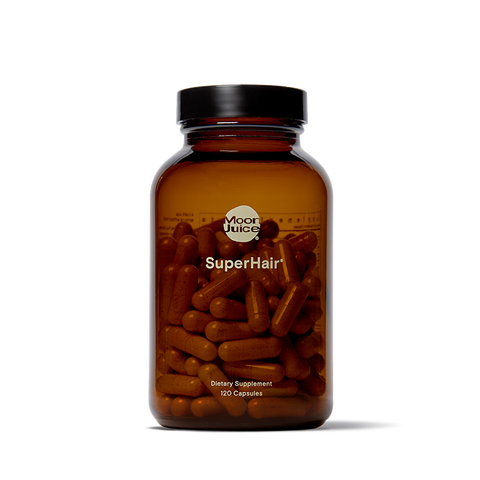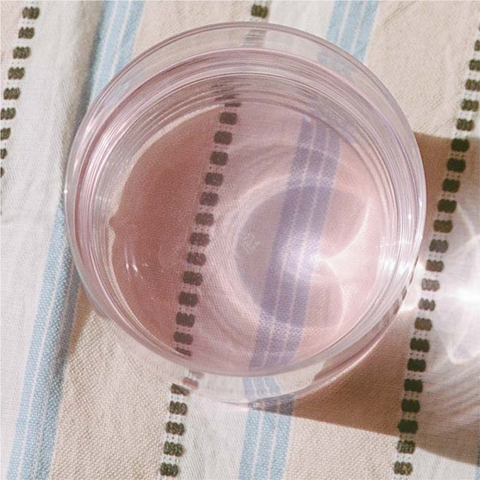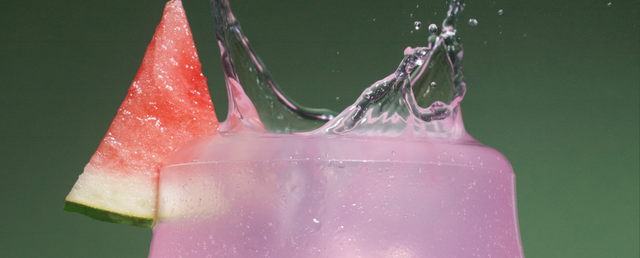Hair thickness, or the amount of hair you have, is an outward sign of inner health. But stress, hormones, harsh treatments, inflammation, allergic reactions, and poor diet can all threaten the amount of hair on our heads.
Though the number of hair follicles we have doesn’t change throughout our lives, there are numerous ways to thicken hair naturally by minimizing hair fall and keeping these follicles healthy so they’re all firing at full blast.
Some natural remedies for thicker hair can help prevent hair thinning and promote healthy growth, while others increase the health of the individual strand so the hair itself is thicker and more voluminous. If you take measures to reduce hair fall and increase the fullness of your hair, you should start to notice thicker hair all around. Wondering how to fix thin hair and achieve a fuller mane? Here’s how to get thicker hair naturally.
1. Address stress and hormones
Stress takes a toll on our hormones, and our hormones control processes throughout our bodies, including our hair cycles. Stress-related hair fall is known as telogen effluvium, referring to the rest stage (telogen stage) in the hair cycle, when it’s time for the hair to fall out.
10-15% of your hairs are in the telogen stage normally at any given time. But during times of high stress on the body, such as childbirth, injury, or life circumstances, the body pushes a higher number of healthy hairs into this fallout phase.
Luckily, telogen effluvium is temporary, and hair tends to grow back. But ahead of, during, and after times of stress, your hair needs all the help it can get. Adaptogens like Ashwagandha can help your body respond to stress more effectively, helping your hormones get back to center.
Taking an herbal blend for internal support can help promote thicker hair against the effects of stress.
2. Eat for hair health
Hair is built of proteins like keratin, a structural protein that strengthens hair. When hair is deficient in keratin, it’s more prone to breakage, and can look dry and frizzy, so it’s essential to consume plenty of high quality protein in order to get the amino acids necessary for achieving a thick structure to your hair.
Your hair also needs essential fatty acids, like Omega-3, which isn’t made by the body. Healthy sebum levels are essential for your scalp’s biome, helping to maintain the proper pH and protect against UV damage, bacteria, and fungus, so it’s good to consume avocados, chia seeds, and other forms of this fat.
Nutritional deficiencies can also weaken strand health and sebum production. In addition to protein and fats, the following micronutrients are important for healthy hair:
- Zinc
- Iron
- Vitamin A
- Biotin and other B vitamins
- Vitamin C
- Vitamin D
- Vitamin E
Try to get plenty of nutrient-dense whole foods including spinach, sweet potato, bell peppers, coconut, blueberries, citrus, and plenty of nuts, seeds, and beans.
3. Consider a hair supplement
Because we’re not always able to manage stress and our many micro nutritional needs on a consistent basis, a good hair supplement can take us much of the way. Specifically formulated to promote healthier, thicker, stronger hair in 4 ways, SuperHair® is a clinical strength hair supplement.
10 bioavailable vitamins make up a comprehensive multivitamin to address the nutritional deficiencies that inhibit the growth of healthy hair.* Adaptogens like Ashwagandha help balance stress hormones that can contribute to thinning and hair loss.* Botanicals like Saw Palmetto support healthy hair follicles and promote thickness, and micronutrients promote hair strength and smooth texture.*
Commit to SuperHair® daily, and you should start to see hair health results in 4 weeks.
4. Shampoo strategically
There’s a lot going on up there. For one thing, there’s your scalp’s sensitive barrier, which likes to be at a pH of 5.5. Disrupting your pH through shampooing too often, too harshly, or too hot, can dry out your scalp and cause problems like dryness, greasiness, and dandruff.
Look for gentle, sulfate-free hair care products without harsh detergents and fragrances, and aim for washing about 2-3 times per week (or 3-4 if you have fine or thin hair).
At the same time, you don’t want to overdo it with the dry shampoo. Remember, it’s not cleansing your scalp — it’s just absorbing oils. The more you use throughout the week, the more product accumulates on your scalp, where it can potentially stifle your hair follicles. Use dry shampoo as a way to extend your shampoo when needed, not replace it.
5. Brush and style gently
The less your hair is breaking off, the thicker your hair will be overall, so style gently. Brushing too much can cause excess hair to come out, but you don’t want to stop brushing completely, as this could lead to tangles that can also snag and cause hair to rip. Find a good balance for your hair and brush starting at the balance, while holding your hair midway at the shaft, and working up.
If you tend to have tangly hair, detangle in the shower using a wet or large-toothed comb, while you have conditioner in your hair for extra slip.
Extensions, dyes, heat styling, and tight hairstyles can all harsh your hair, so if you’re looking to thicken hair naturally, opt for gentler styles. Lightening your hair actually causes it to become thinner and more vulnerable, so consider keeping your color natural while you give your hair a rest. Silk pillowcases, gentle hair ties that don’t pull at your hair, and microfiber towels for drying your hair can all help keep hair at its fullest.
Hair fall can increase along your part line, so it’s also a good idea to change up your part so it’s not always in the same place.
6. Stimulate your scalp
Follicles that are starved of blood flow are less likely to grow new hairs, so it’s a good idea to encourage circulation by way of a gentle scalp massage using a silicone tool, large-toothed comb or simply your fingers. Spend some time before you shampoo to massage your scalp in sections using gentle circular motions.
7. Use a topical treatment
Aside from protecting your scalp’s pH and giving yourself regular scalp massages, you can also improve scalp health by using natural remedies to thicken hair. Studies on rosemary oil have found that it is equally as effective as Minoxidil (aka Rogaine) at promoting hair growth after six months. Look for products or make your own using scalp-healthy ingredients like rosemary hair oil and peppermint oil.
8. Maintain hydration
You already know how important hydration is for your skin health, but did you know it’s also important for your hair? Each strand of your hair is made up of about 25% water. When you’re dehydrated, scalp and hair are some of the last places your body will send precious water resources, so stay on top of your water intake by drinking at least 8 glasses a day to encourage your best hair health.
9. Try a hair mask (castor oil, aloe vera)
Just like your skin, your hair needs humectants for hydration and occlusives to lock in moisture.
Each strand of your hair has three layers:
- the inner medulla (a thin, tunnel-like core in the center)
- the middle cortex (the thickest layer, that gives hair its color and texture)
- the outer cuticle (made up of dead cells to protect the inner layers)
When your hair is hydrated, that means the inner two layers have absorbed enough water. When your hair is moisturized, it means that moisturizing oils have helped seal in the cuticle layer to prevent this water from evaporating.
A weekly or monthly hair mask using fresh ingredients like castor oil and aloe vera can help hydrate strands, fill in hair damage, and add thickness and shine.
Just don’t add too much moisture. With your hair you need to avoid stress from hygral fatigue. This form of hair damage happens when too much moisture penetrates, causing the strand to swell and unswell. To keep hair from becoming fatigued, don’t use a hair mask or deep conditioning treatment for too long or too often. Once a week is plenty.
10. Let your scalp breathe
You might be tempted to wear a hat, wig, or scarf at all times while you’re recovering from telogen effluvium, but again — you don’t want to stifle new growth, so give your scalp plenty of fresh air to create a positive environment and avoid bacteria overgrowth, itchiness, and other problems.
11. Style for volume
Healthy, thick hair doesn’t happen overnight. It takes time to build balanced health that shows in your strands. So while you’re waiting for new growth and thickness, you might as well make the most of the hair you have now. Start in the stylist’s seat: a shorter cut can make hair appear considerably more voluminous, while layers and colors can add shape and dimension.
Thin, fine hair can be slippery and stringy to style. Using a salt spray will help add grip to your strands so you can achieve the look of fuller hair.
Sign Up, Nerd Out
Get wellness tips, education, and recipes
delivered straight to your inbox.
Get wellness tips, education,
and recipes delivered
straight to your inbox.
Takeaways
The health and thickness of your hair are inextricably linked to balance in diet, stress, hormones, and hydration. Additionally, there are some ways you can care for your scalp and style your hair to encourage more healthy hair growth, prevent hair fall, and maximize volume in your mane.
For healthy hair growth, it’s key to eat a nutrient-dense diet and take vitamins for thicker hair. In support of that, try a daily hair supplement like SuperHair® to help fill in nutritional deficiencies and address stress.
Being gentle with your hair from shampooing to styling can help prevent hair breakage in your everyday environment, while using natural masks, treatments, and sprays on your strands can help increase fullness.
Sources
- Abelan, U. S., de Oliveira, A. C., Cacoci, É. S. P., Martins, T. E. A., Giacon, V. M., Velasco, M. V. R., & Lima, C. R. R. C. (2022). Potential use of essential oils in cosmetic and dermatological hair products: A review. https://pubmed.ncbi.nlm.nih.gov/34129742/
- Ezekwe, N., King, M., & Hollinger, J. C. (2020). The Use of Natural Ingredients in the Treatment of Alopecias with an Emphasis on Central Centrifugal Cicatricial Alopecia: A Systematic Review. https://pubmed.ncbi.nlm.nih.gov/33178378/
- Fischer, T. W., Trüeb, R. M., Hänggi, G., Innocenti, M., & Elsner, P. (2012). Topical melatonin for treatment of androgenetic alopecia. https://www.ncbi.nlm.nih.gov/pmc/articles/PMC3681103/
- Panahi, Y., Taghizadeh, M., Marzony, E. T., & Sahebkar, A. (2015). Rosemary oil vs minoxidil 2% for the treatment of androgenetic alopecia: a randomized comparative trial. https://pubmed.ncbi.nlm.nih.gov/25842469/
- Zempleni, J., Hassan, Y. I., & Wijeratne, S. S. (2008). Biotin and biotinidase deficiency. https://pubmed.ncbi.nlm.nih.gov/19727438/














